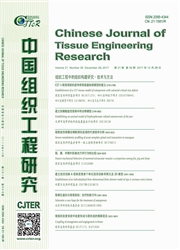

 中文摘要:
中文摘要:
目的探讨微囊化肝细胞移植对肝脏功能的代偿能力。方法以D-氨基半乳糖胺(D-gal)作为肝脏毒剂,构建SD大鼠急性肝功能衰竭模型。通过腹腔移植分别植入微囊化肝细胞和游离肝细胞。结合谷丙转氨酶(ALT)、谷草转氨酶(AST)、白蛋白(ALB)、总胆红素(TBIL)多项血生化指标以及模型动物生存率比较,评估植入细胞对肝功能衰竭的代偿能力。结果细胞植入后12 h开始对模型动物的肝生化指标ALT、AST、TBIL、ALB产生影响,其影响力在细胞植入后24-48 h达到高峰。对比游离肝细胞,微囊化肝细胞移植对各项肝生化指标的改善尤为明显,且动物的存活率最高。结论微囊化肝细胞腹腔内移植有助于提高药物诱导急性肝功能衰竭大鼠的存活率,可明显改善急性肝功能衰竭模型大鼠的肝功能。
 英文摘要:
英文摘要:
Objective To investigate the compensatory ability of microencapsulated hepatocyte transplantation on acute hepatic failure rats.Methods An acute hepatic failure rat model was induced by celiac injection of D-gal.Microencapsulated and non-microencapsulated rat hepatocytes BRL were transplanted into acute hepatic failure model rat by abdominal cavity administration,respectively.The blood levels of ALT,AST,TBIL,ALB as well as survival rate of host rats were comparably analyzed to evaluate the compensatory ability of microencapsulated hepatocytes for the prostrate liver.Results Levels of ALT,AST,TBIL and ALB were influenced in acute hepatic failure rat model at 12 h after transplantation,and peaked between 24-48 h.Compared with the non-microencapsulated cell,the level of liver biochemical index improved obviously and the survival rate was the highest in microencapsulated hepatocytes.Conclusion After microencapsulated hepatocyte transplantation,the survival rate of acute liver failure rats induced by D-gal increased and the liver function improved obviously.
 同期刊论文项目
同期刊论文项目
 同项目期刊论文
同项目期刊论文
 期刊信息
期刊信息
